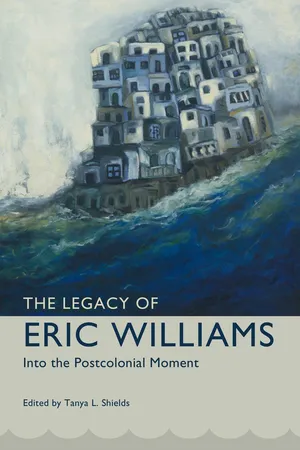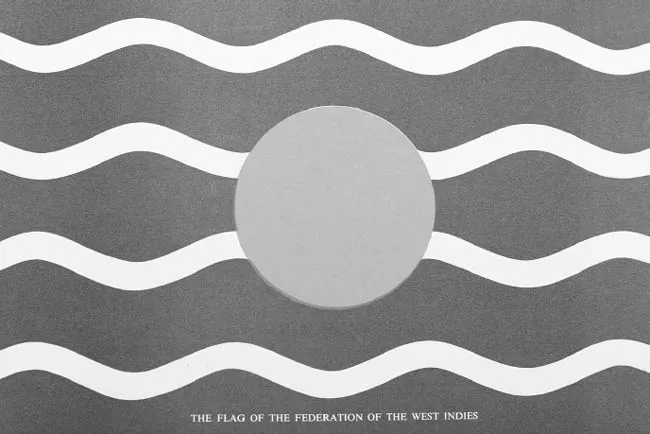![]()
Part II
POLITICAL WILLIAMS
![]()
Chapter 3
“WE INTEGRATE OR WE PERISH”
Eric Williams, Forbes Burnham, and the Regional Integration Movement
CECILIA MCALMONT
It was relatively early in the existence of her New World colonial empire that Great Britain began attempting to forge a closer union among her geographically dispersed colonies to achieve administrative efficiency and economy. As early as the last quarter of the seventeenth century, Britain attempted to form a federation of the Leeward Islands, but jealousy among the members of the legislatures involved soon paralyzed that attempt. The economic decline during the latter half of the century prompted a rather more substantial attempt at federation of the Leeward Islands in 1871. Despite its unpopularity, the idea for federation managed to survive until the eve of the infamous Barbados Confederation Riots in 1876, which ended the attempt to join Barbados with the Windward Islands.
In the first decades of the twentieth century, the emerging political and trade union leaders did not at first favor federation. However, in the aftermath of the widespread riots in the region during the mid-1930s, the leaders chafed under the restrictions of the Crown Colony government, which had failed to deliver on its promises of social, economic, and political improvement. It was with the acquisition of self-government or, even better, political independence that these goals could be achieved. Yet the island leaders were aware that, due to their small size, Great Britain would be more likely to consider the idea of self-rule under the auspices of federation.
These leaders had as their examples the political federation of Britain’s larger colonies, Canada and Australia. In the years after World War II, Britain was anxious to rid herself of her burdensome Caribbean colonies and pass hegemony to the United States. Consequently, bolstered by a consensus among the West Indian leaders, Great Britain summoned a series of conferences that culminated in the West Indies Federation of 1958. Yet this was the idea’s only success, for soon the island nations themselves would fail to agree.
3.1 The flag of the ill-fated federation often Anglophone Caribbean territories. Photograph courtesy of the University of the West Indies Alma Jordan Library.
Eric Williams played an important role in the federation debacle. Indeed, Williams’s political career as a leader of a government party coincided with the birth of the federation. Forbes Burnham then entered the regional integration scene shortly after he became premier of Guyana in 1964.
The two men had contrasting personalities. Williams was an introvert, reclusive—almost secretive—but an original thinker. Burnham was a natural extrovert, full of bonhomie, a doer, and a superb orator. But they had several things in common. Their characters were fashioned of the same clay, that is, of the elitist British education they received a decade apart but during the time between world wars, a period of political and intellectual ferment that transformed Great Britain. Williams was a historian, an academic, and a teacher. Burnham, though a lawyer by training, also possessed a sense of history and likewise understood the impact of colonialism’s legacy on the Caribbean man.
Consequently both men resented this psychological thralldom and saw regional integration as a means of breaking it; yet they gloried in what they had achieved under colonialism’s tutelage. This stood as a contradiction, one that played itself out in the very mechanisms they supported in an effort to achieve regional integration. They accepted, with little modification, the paradigms, theories, and models of integration designed by and for their exploiters as a means of achieving integration among the exploited. They also roundly condemned the regional characteristics of fragmentation, insularity, individualism, and parochialism that hampered integration’s progress. Yet Williams and Burnham seemed ignorant that, as Caribbean men themselves, they were nurtured in, and were products of, that same environment. Their denial of this personal legacy stands as one of the main weaknesses in their attempts to forge regional integration with their neighboring island governments.
What Williams and Burnham had in common, too, was the broader concept of what constituted the Caribbean region. They were both pragmatists, and the role they played in the regional integration process was determined by the different political realities of their individual circumstances. Both men have been praised for their vision in conceptualizing and supporting integration. However, consideration of recent and earlier assessments of these instruments reveals that, despite their avowed commitment, Williams and Burnham played a major role in creating a set of handicapped children. The last surviving sibling, the common market of the Caribbean Community (CARICOM), was in fact abandoned in its toddlerhood and virtually had to fend for itself for seven years.
It is within this context that this essay examines the contribution, impact, and legacy of Eric Williams and Forbes Burnham on the regional integration movement. The essay is divided into five sections. The first section explores Williams’s role in the West Indies Federation and the factors that handicapped it. The second section addresses the significance of the Conferences of Heads of Government. The third section explores the Caribbean Free Trade Association (CARIFTA) and Williams’s and Burnham’s motives for its establishment. The fourth section discusses CARICOM and the roles of Williams and Burnham through the light of several assessments. Finally, the fifth section addresses the hiatus years and their impact on CARICOM, as well as on the legacy of Williams and Burnham to Caribbean integration.
THE WEST INDIES FEDERATION
The West Indies Federation can be regarded as the first of the three challenged infants born in the pursuit of regional integration during the twentieth century. Its first significant handicap was that its framers were not local politicians but rather the expatriate representatives of the mother country who had an extremely narrow view of federation. According to Gordon Lewis, Britain “saw the West Indies leaders as, primarily, Her Majesty’s Ministers overseas and not as a vanguard of West Indian regional nationalism.”1 This idea explains why Mother England “invested the office of Governor-General, not that of the Prime Minister, with most of the panoply of the federal power,”2 a concept Williams protested most vigorously.
That this was a political federation, one that tried to encompass several different levels of economic integration, was its second handicap.3 The framers were faced with the inherent problems of ensuring freedom of movement and free movement of goods, as well as a customs union and federal taxation. Most of these matters were left, in typical West Indian style, to be dealt with later. Williams described the birth of the federation thus: “The infant nation was presented to the world in swaddling clothes made in the United States of America out of the made-in-Britain shroud of colonialism.”4 Williams supported what he knew to be a handicapped instrument precisely because he saw federation as the means whereby the shackles of colonialism, which held the psyche of the Caribbean people in thrall, could be broken.5
Additionally, Williams realized that the islands had a long history of insularity, which was rooted in the development of its economy and trade. He envisaged that integration through federation would help to counteract the legacy of fragmentation and parochialism.6 He also realized that the ultimate goal of independence could only be achieved at that stage through the acceptance of federation.
Over the next two years, he tried to introduce the modifications he felt would make the federation a more fitting instrument for integration. But his attempts soon brought conflicting perceptions of federation to the fore and with them the insular jealousies and rivalries he hoped federation would cure. The federal infant was being suffocated by the very ideas it was born to eradicate. In the end, it was this insularity and the selfish pursuit of individual national interests that led Jamaica to withdraw from the federation first, with Trinidad and Tobago following soon thereafter, leading to federation’s demise. Thomas Gittens states the point well:
[Federation] failed not just because the leaders of the separate units were too nationalistic or insular, but more intrinsically because their insularism was so strong as to totally emasculate the institution and powers of Federation to render it incapable of surviving.7
In the end, therefore, it was the neglect of the infant while its parents squabbled over its development as much as the American-made swaddling clothes and “British-made colonialist shroud” that smothered it.8 Like many undernourished children of the developing world today, as in the past, federation died before its fifth birthday.
The role of Eric Williams in this debacle was an ambiguous one. He supported federation because he saw it as the means of achieving integration, but at the same time, he recognized its shortcomings as a mechanism for achieving integration. He aired his dissatisfaction about these defects and, when he was in a position to do so, tried to modify them. However, his own action of withdrawing Trinidad and Tobago from the federation emphasized that he was fashioned in the same mold and driven by the same jealousies of those he accused.
THE CONFERENCES OF THE HEADS OF GOVERNMENT
The Heads of Government Conference (HGC) was one of the most important entities created in the pursuit of regional integration. It underlined the role of Williams as the leader and visionary figure of the integration movement, but it also institutionalized some of the weaknesses that continued to plague the movement. While still basking in the euphoria of leading his country into independence on the heels of the breakup of the federation, Williams was conscious of the truism that the best way to proceed after a disaster was to immediately get back into the fray. He was ready with another proposal to move the integration process forward. Again, herein lay the duality of strength and weakness. Williams clearly did not spend enough time examining the lessons learned from the failure of the federation. He—or the other Caribbean leaders, for that matter—had not afforded himself enough time to reflect on their collective and individual roles in that failure; nor did they all examine what could be done to prevent a recurrence. They came to the table not with clear, open minds but with the bulging baggage of the past.
The tactic was to be different this time. It would be a slow movement toward economic cooperation, at the same time giving Williams the opportunity to incorporate his wider vision of the Caribbean region. Williams invited his colleagues to attend what turned out to be the first meeting of the HGC to discuss the creation of Caribbean commu...

